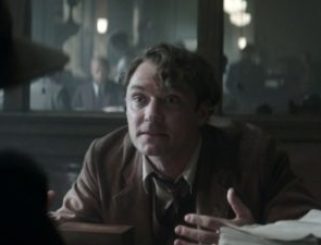
It’s hard for me to dislike a movie about the Tudors. But not impossible. Firebrand, the new movie about Henry VIII’s sixth and last wife, Katherine Parr, directed by Karim Aïnouz (trailer), could have almost as accurately been called The Somnambulist. The fact that four separate women are credited with the screenwriting could be part of the problem: no one vision dominates.
Alicia Vikander walks through her role as Katherine, never making a convincing queen, almost never showing much emotion. She’s married to a mercurial and dangerous man. Powerful people, including the reactionary Bishop Gardiner (played by Simon Russell Beale) oppose her liberal religious beliefs and want to bring her down. Yet she seems strangely unmovable.
Just about the only time she gets her emotions up is when she’s pleading with her friend, Protestant reformer Anne Askew (Erin Doherty), to flee England. Anne, one of England’s earliest female poets, was tortured and burned at the stake for her religious preaching. She does have fire and wit, and what ignites her passion is her belief that common people should be able to read the Bible in English for themselves, rather than be dependent on priests to translate the Latin and tell them what scripture says and means. The contrast between her and the impassive Catherine couldn’t be greater.
So let’s talk about Jude Law, who plays Henry VIII. Corpulent and capricious, he held my gaze every time he was on screen. I could not find the familiar actor in the appearance or increasingly paranoid behavior of this character. If Vikander is not a convincing royal personage, he embodies his position absolutely. He is a king.
Some aspects of the movie are historically accurate, such as Catherine’s close relationships with Henry’s children: Mary (daughter of Catherine of Aragon, Henry’s first wife); Elizabeth (daughter of Anne Boleyn, his second), and Edward (son of Jane Seymour). It acknowledges her authorship of prayer books—the first Englishwoman to have books published under her own name. A prayer she utters in support of Henry, ended up in the Church of England’s Book of Common Prayer where it remains today.
Alas, some aspects of the story are not historically accurate, including the dramatic yet unconvincing final scene, and a number of episodes created in the hope of increasing the film’s suspense. Given that so much is at stake for the people and causes of England at this time, it’s surprising that the movie, when Henry isn’t in it, is so turgid. Much is made cinematically about Henry’s ulcerating leg wound. Gruesome, but not suspenseful. I can’t recommend this, despite Law’s wonderful performance. Coming to streaming soon; that might be a good choice.
Rotten Tomatoes critics’ rating: 54%; audiences: 69% (and that may be for the costumes).

 Director Michael Grandage’s movie Genius (
Director Michael Grandage’s movie Genius (